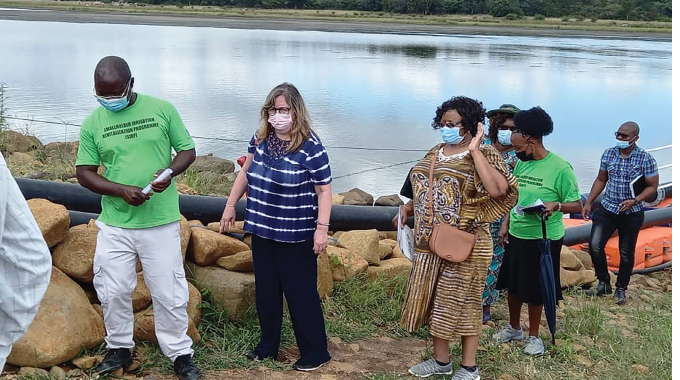US$100m to revive agriculture sector

Patrick Chitumba, Midlands Bureau Chief
THE Second Republic’s re-engagement efforts continue to bear fruit with an international financial institution International Fund for Agricultural Development (IFAD), committing a package amounting to over US$100 million towards reviving the country’s agriculture sector.
There is also a chunk in the package from the Norwegian Government and other supporting partners towards revival of irrigation schemes and agricultural programmes such as horticulture farming.
IFAD is an international financial institution and specialised United Nations agency based in Rome. IFAD has already released $51,6 million towards the Smallholder Irrigation Revitalisation Programme (Sirp) and part of the funds have gone towards the rehabilitation of Mayorca Irrigation Scheme in Zhombe, Midlands Province, as well as Silalabuhwa and Guyu irrigation schemes in Matabeleland South among other programmes.
IFAD is committing to setting aside over US$60 million for the Smallholder Cluster Agriculture Programme that includes horticulture to run in five provinces that will include Midlands and Matabeleland North among others.

IFAD country director for Eswatini and Zimbabwe Mrs Jaana Keitaanranta at Mayorca Irrigation Scheme dam in Zhombe yesterday
In an interview after touring the revived Mayorca Irrigation Scheme yesterday in Zhombe, IFAD country director for Eswatini and Zimbabwe Mrs Jaana Keitaanranta said the financial institution has more projects lined up for the country as it seeks to partner the Government in poverty eradication in communities.
“As IFAD, we are a financial institution and Sirp is our first project in Zimbabwe since a lengthy period of absence and Sirp has a total of US$52 million.
The moment we stopped (funding) was when Zimbabwe had arrears with most of the financial institutions but then my institution had a debt settlement plan with the Government of Zimbabwe.
The debt settlement was accomplished and paid and so that was the moment when we started treating Zimbabwe like any other country. That is when Sirp was done following the debt settlement plan,” she said.
Mrs Keitaanranta said IFAD is willing to support Zimbabwe through various funding models for the agriculture sector.
“The problem has been sorted out and we have been looking at how else we can support the country in addition to the macro projects because also in addition, we have micro projects which we want to fund.
We have a grant from Government of Norway for nutrition programmes in the country. So we have many projects lined up for the country. We already have US$52 million that is running under Sirp.”
Ms Keitaanranta said they have a new programme starting under the Lands, Agriculture, Fisheries, Water and Rural Development called the Smallholder Cluster Agriculture Programme.
“The programme is still at the early days of recruitment and so it hasn’t started yet, but will be funded around US$60 million and at the same time we have been requested to consider signing for project number three for the horticulture sector. So the programme is increasing in size and it will come out to be of the same size as Sirp,” she said.
Ms Keitaanranta said she was happy with progress at Mayorca Irrigation Scheme, saying the members were mature, motivated and eager to see the project growing.
“Because of Covid-19, I could not visit the project and was just following the reports I was receiving. But now I am seeing lots of progress and I believe in months to come there will be more progress.
I think sustainability of irrigation schemes is very important because some irrigation schemes have failed in the past or the members have failed to maintain and I think this operation is well on course because they are putting some money aside that will be used for repairs and keeping the irrigation scheme alive and that is very important,” she said.
At Mayorca Irrigation Scheme, over US$900 000 has gone towards rehabilitating the breached dam wall section, construction of a spillway channel, stone pitching for slope protection and grassing, installation of a transformer, and installation of two pumps on a floating pontoon among other developments.
The 76ha irrigation scheme has turned green this year following the funding from IFAD. The scheme has 76 members who own 1ha each.
Of the 76 beneficiaries 18 are females, 58 males and each farmer has an acre to his or her name. Mr Naison Mauka, the secretary for the irrigation scheme, said they were looking forward to a change of fortunes following the resuscitation of the scheme.
“This place is relatively in a dry region. As you can see, most crops in the fields are experiencing moisture stress. Our hope is now with the irrigated crops. We are very happy that our scheme is now up and running. It’s been years since we used our water for irrigation purposes. It’s a life changing experience,” he said.
The Mayorca Irrigation Scheme which had stopped operations in 2007 after the dam wall was breached by floods and had electricity lines vandalized, became operational this January following the intervention of Government in partnership with IFAD.
Ends










Comments